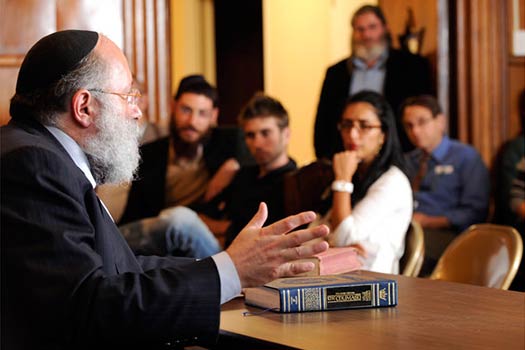
8:00pm: Are Prayer and ‘Tracht Gut Vet Zein Gut’ Compatible?
This week’s edition of MyLife: Chassidus Applied with Rabbi Simon Jacobson, Episode 153, will air tonight, Sunday, here on CrownHeights.info, beginning at 8:00pm. This week Rabbi Jacobson will address the topics: Are Prayer and ‘Tracht Gut Vet Zein Gut’ Compatible? How to Cope with Social Anxieties? Would the Rebbe’s Attitude Toward Secular Education Perhaps be Different Today? Opening “Noah Houses”?
In Tanya, Chapter 27, the Alter Rebbe discusses that the Beinoni should not be distressed by the occurrence of sinful thoughts in his mind. On the contrary, he ought to rejoice, for by repulsing these thoughts and promptly averting his mind from them, he fulfills the commandment of “not going astray after one’s heart,” and thereby crushes the spirit of the sitra achra, consequently causing intense Divine pleasure. The Alter Rebbe goes on and says that this applies “even in matters that are fully permissible… [for example] if one restrains his mouth from saying things which he greatly desires to say, concerning mundane matters. How can someone incorporate this into his life? Does this imply that we shouldn’t participate in any conversation about mundane matters? Isn’t it in a way removing oneself from joining socially in conversation? To what extent do we have to restrain from speaking our minds in such matters?
How is prayer compatible with the idea of tracht gut vet zein gut? One davens to plead for brochos or desired outcomes implying that he’s worried and in a needy state. Living with a mindset of tracht gut vet zein gut, as Chassidus demands, means that there is nothing to worry about, no troubled situations to escape, because it’s all good. So how can both, prayer and believing that everything is good, be central themes in our lives?
The Rebbe spoke many times about the importance of inspiring non-Jews to fulfill the Noachide Laws. If opening Chabad Centers is becoming less and a less of an available option for young couples, should they perhaps consider opening centers that teach the 7 Mitzvos Bnei Noach? Is this possibly the next step in bringing Mashiach? And is this a sustainable and realistic idea?
There’s evidence to suggest that many more people suffer from anxiety today than a century ago. Psychologist spend countless time on finding solutions and coping methods to help. What advice does Torah and Chassidus offer in dealing with social anxieties?
These will be among the relevant issues Rabbi Jacobson will address in this week’s 153rd episode of MyLife: Chassidus Applied.
Rabbi Jacobson will also review the following essays submitted in the last MyLife: Chassidus Applied essay contest: “The Myth of Self-Reliance” by Blanche Nudel; “The Paradox of Emptiness” by Chaim Kind; and “The Subconscious Tzaddik” by Shmuel Chein. These and other essays can be read online at meaningfullife.com/essays.
And finally, the Chassidus question of the week: Part VIII in a comprehensive series of understanding the implications of the Kabbalistic concept of Reshimu.
This hour-long dose of insights is meant to inform, inspire and empower us by applying the teachings of Chassidus to help us face practical and emotional challenges and difficulties in our personal lives and relationships. To have your question addressed, please submit it at meaningfullife.com/mylife.
The topics in this Sunday’s hour-long broadcast will include:
- Chassidus Applied to Zayin Adar, Tetzaveh and Zachor
- How can we refrain from conversation about mundane concerns?
- To pray or to tracht gut?
- How to cope with social anxieties
- Is creating “Noah Centers” round the world a viable initiative?
- Would the Rebbe’s attitude towards secular education change in our current times?
- Moshe Rabbeinu’s leadership: follow-up
- Chitas for women: follow up
- Chassidus Question: Reshimu Part VIII
- MyLife Essays: The Myth of Self-Reliance, The Paradox of Emptiness, The Subconscious Tzaddik
In what has now become a staple in so many people’s lives, MyLife: Chassidus Applied addresses questions that many people are afraid to ask and others are afraid to answer. When asked about the sensitive topics he has been addressing, Rabbi Simon Jacobson commented, “I understand that the stakes are high and great care has to be taken when speaking openly, but the silence and lack of clarity on matters plaguing the community can no longer go unaddressed. The stakes of not providing answers are even higher.”
The on-going series has provoked a significant reaction from the community, with thousands of people viewing each live broadcast and hundreds of questions pouring in week after week. At the root of every question and personal challenge tackled by the series is the overarching question: Does Judaism have the answers to my personal dilemmas?
In inimitable “Jacobson-fashion”, the broadcast answers people’s questions in simple, clear language while being heavily sourced. Each episode is jam-packed with eye-opening advice from the Rebbeim, gleaned from uncovering surprising gems in their letters, sichos and maamorim that address our personal issues with disarming relevance. Simultaneously, Rabbi Jacobson is able to crystallize a concept quickly, succinctly, and poignantly for any level of listener.
All episodes are immediately available for viewing in the MLC’s archive and can be downloaded as MP3s for listening on the go.
Questions may be submitted anonymously at meaningfullife.com/mylife














